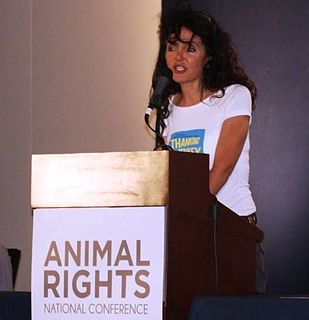A Quote by Steve Ells
So much of today's food is based on the exploitation of animals and the environment. Yes, it's cheap, but at what cost?
Quote Topics
Related Quotes
We need to realize that these industrial methods of farming have gotten us used to cheap food. The corollary of cheap food is low wages. What we need to do in an era when the price of food is going up is pay better wages. A living wage is an absolutely integral part of a modern food system, because you can't expect people to eat properly and eat in a sustainable way if you pay them nothing. In fact, it's cheap food that subsidized the exploitation of American workers for a very long time, and that's always been an aim of cheap food.
Farmers since the beginning of time have been feeding the world very successfully without systematically abusing animals or destroying the environment. But we're breeding food that is less safe for us, it tastes much worse than it ever has in history, and it's wreaking havoc on the environment in a way that it never did in history before. All in the interest of it being cheap.
The word "veganism" denotes a philosophy and way of living which seeks to exclude - as far as is possible and practical - all forms of exploitation of, and cruelty to, animals for food, clothing or any other purpose; and by extension, promotes the development and use of animal-free alternatives for the benefit of humans, animals and the environment. In dietary terms it denotes the practice of dispensing with all products derived wholly or partly from animals.
The health of the planet is at stake, because the cruelty and the waste that accompanies the slaughter of billions of animals each year literally infects us all. We could consume healthy plant-based food produced at almost infinitely less cost. What does that say, really, about us and what we're doing... to animals and to ourselves?
Go to the farmers market and buy food there. You'll get something that's delicious. It's discouraging that this seems like such an elitist thing. It's not. It's just that we have to pay the real cost of food. People have to understand that cheap food has been subsidized. We have to realize that it's important to pay farmers up front, because they are taking care of the land.
Who taught me that animals were put on this Earth for food? Who taught me to disrespect animals and view them as mere commodities? Who stole my compassion, my empathy and my conscience? Who lied to me? Who instilled this vicious mindset of human-to-animal exploitation as standard operating procedure?
When I see vegan food sold in single-use plastic containers, I get frustrated knowing that plastic is not really recycled; it is down-cycled to less and less reusable grades, and too much of it eventually ends up in the ocean - where it kills animals. Caring for animals means caring for the environment they live in, and vice versa.
The ninety-nine cent price of a fast-food hamburger simply doesn't take account of that meal's true cost--to soil, oil, public health, the public purse, etc., costs which are never charged directly to the consumer but, indirectly and invisibly, to the taxpayer (in the form of subsidies), the health care system (in the form of food-borne illnesses and obesity), and the environment (in the form of pollution), not to mention the welfare of the workers in the feedlot and the slaughterhouse and the welfare of the animals themselves.
Fast food may appear to be cheap food and, in the literal sense it often is, but that is because huge social and environmental costs are being excluded from the calculations. Any analysis of the real cost would have to look at such things as the rise in food-borne illnesses, the advent of new pathogens, antibiotic resistance from the overuse of drugs in animal feed, extensive water pollution from intensive agricultural systems and many other factors. These costs are not reflected in the price of fast food.
































